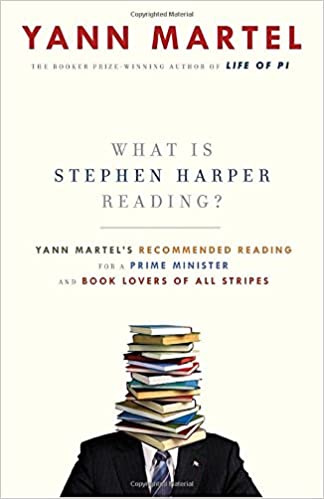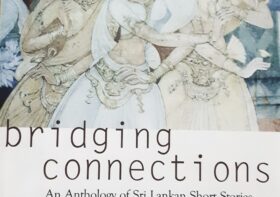What is Stephen Harper Reading? – Yann Martel
వ్యాసకర్త: పద్మవల్లి
What is Stephen Harper Reading? – Yann Martel’s Recommended Reading for a Prime Minister and Book Lovers of All Stripes

“We are all busy. But every person has a space next to where they sleep, whether a patch of pavement or a fine bedside table. In that space, at night, a book can glow. And in those moments of docile wakefulness, when we begin to let go of the day, then is the perfect time to pick up a book and be someone else, somewhere else, for a few minutes, a few pages, before we fall asleep.”
మార్చ్ 2007లో, కెనడాలోని ఆట్టావా నగరంలో Canada Council of Arts 50వ వార్షికోత్సవాలు జరుగుతున్నాయి. దానికోసం ప్రత్యేకంగా ఆ యాభయ్యేళ్లకూ (1957 నుండీ 2007 వరకూ) ప్రతినిధులుగా ఒక్కో సంవత్సరానికి ఒకరు చొప్పున, యాభై మంది వివిధ రంగాల్లోని కళాకారులని ఆహ్వానించారు. యాన్ మార్టెల్ (లైఫ్ అఫ్ పై రచయిత) కూడా 1991 కి ప్రతినిధిగా అక్కడకు వెళ్లారు. వేడుకలు జరిగే రోజున, కెనడా చరిత్రా సంస్కృతీ ప్రతిబింబించేలా గొప్పగా అలంకరించబడిన House of Commons (పార్లమెంట్) హాల్లో అందరూ చేరారు. వేదిక మీద కొందరు పార్లమెంట్ మంత్రులు కూర్చొన్నారు. వేడుక మొదలయ్యే సమయానికి, సాంస్కృతిక శాఖా మంత్రి నిలబడి, అతిథి కళాకారులను ఒకసారి పలకరించి, తన ప్రసంగం మొదలుపెట్టారు. ఆర్టిస్టులు అందరూ కూడా గౌరవంగా నిలబడి, మంత్రి ప్రసంగం వింటూ ఉండగానే నిముషాల్లో ఆమె ప్రసంగం ముగిసిపోయింది. మొత్తం మీద ఐదు నిముషాలు కూడా లేదు ఆమె ప్రసంగం. వేదిక మీద మిగిలిన అందరూ వేరే ముచ్చట్లలో మునిగిపోయారు. అది చూసి అతిధులంతా విస్తుపోయారు. ‘ఒక కవయిత్రి కూర్చొంటూ ఒక నవ్వు నవ్వి, నమ్మలేనట్టుగా తల విదిలించింది, కానీ నాకు నవ్వడానికి కూడా ఓపిక లేదు’ అంటారు యాన్. దానితో ఆయనకి దేశ ప్రజలందరి తరపునా జరుపుకునే ఇంత గొప్ప సంబరాలకి ప్రాముఖ్యత ఇంతేనా అని నిరుత్సాహం కలిగింది. అదే పారిస్ లేదా ఏ ఇతర యూరోప్ దేశాలైనా సంవత్సరమంతా ఎంత గొప్పగా సెలబ్రేట్ చేసేవో కదా అనుకుంటే విరక్తిగా అనిపించింది.
అదే సమయంలో యాన్ దృష్టి వేదిక మీదున్న ప్రధానమంత్రి స్టీవెన్ హార్పర్ మీద పడింది. అక్కడ ఉన్నంత సేపూ స్టీవెన్ దృష్టి జరుగుతున్నదాని మీద కానీ, వచ్చిన అతిధుల మీద కానీ లేదు. ఆయన లోకంలో ఆయనున్నాడు. వచ్చిన అతిధుల గురించి మంత్రి ప్రస్తావించినపుడు అయినా కనీసం తలెత్తి చూడలేదు. ఆయన పధ్ధతి యాన్ కు చిర్రెక్కించింది. అంతకు కొన్ని నిముషాల ముందే ఆయన మనిషి జీవితం లోని పరుగుల గురించీ, అప్పుడప్పుడూ ఏర్పడే స్థిమితం/ప్రశాంతత గురించి ఆలోచిస్తూ ఉన్నారు. ఓ కళని ఆస్వాదించాలన్నా, ఓ పుస్తకం చదవాలన్నా కూడా స్థిమితం అవసరం కదా అనుకున్నారు. ఇంత బిజీగా ఉన్న స్టీవెన్ కు కూడా రాజకీయాలే కాకుండా, స్థిమితంగా ఉండే క్షణాలు కొన్నయినా ఉండే ఉంటాయి కదా, ఆ సమయంలో ఆయన ఏం చేస్తాడో అనిపించింది. ఆ కొద్ది సమయాన్ని ఉపయోగించి అతనిలో మరింత ప్రశాంతత కలిగేలా ఏం చెయ్యలా అనుకున్నాడు.
“Since I deal in books, reading and writing them, and since books and stillness go well together, I decided, by means of good books, to make suggestions that would inspire stillness in Stephen Harper.”
ఏప్రిల్ 2007లో మొదలుపెట్టి, రెండు వారాలకో పుస్తకం, ఆ పుస్తకాన్ని తను ఎందుకు ఎంచుకున్నాడో, పుస్తకం గురించో రచయిత గురించో కొన్ని విశేషాలూ, అది స్టీవెన్ కు ఎలా ఉపయోగపడుతుందని తను అనుకుంటున్నాడో వివరిస్తూ ఓ ఉత్తరం కలిపి ప్రైం మినిస్టర్ ఆఫీసుకి పోస్ట్ చెయ్యడం మొదలుపెట్టారు. దాదాపు రెండు సంవత్సరాల పాటు విసుగు విరామం లేకుండా పుస్తకాలు పంపిస్తూనే ఉన్నారు.
యాన్ పంపిన పుస్తకాలు/ఉత్తరాలకి జవాబుగా, మొదటి పుస్తకం పంపిన తర్వాత ఒకసారి, రెండు సంవత్సరాలు దాటాక ఒక్కసారి స్టీవెన్ సెక్రటరీ నుండి మొక్కుబడిగా థాంక్స్ చెపుతూ జవాబు వచ్చిందట. అంతే. స్టీవెన్ ఈయన పంపిన పుస్తకాలు ఆత్రుతగా చదివేసి వెంటనే జవాబు రాసేస్తారనే భ్రమలో ఏమీ లేరు యాన్. అయితే కనీసం మొక్కుబడిగా కాకుండా నిజాయితీగా ఎప్పుడన్నా ఒక్క ఉత్తరం వస్తే బావుండని మాత్రం ఉండేది ఆయనకి. అది మెచ్చుకుంటూనో, కృతజ్ఞతగానో అక్కర్లేదు. ‘నువ్వు పంపిన పుస్తకాలు చూసానోయ్’ నుండి ‘నా తీరిక సమయంలో నేనేం చేస్తే నీకెందుకయ్యా’ అనో ‘బాబూ పంపినవి చాలు గానీ ఇక నన్ను విసిగించకు’ అనో ‘ఇప్పుడు కాదు గానీ రాజకీయాల్లోంచి రిటైర్ అయ్యాక చదువుతాలే’ అనో ‘పోవోయ్ నేనసలు పుస్తకాలే చదవను’ అనో… ఇలా ఎదో ఒక జవాబు అతని నుంచి నిజాయితీగా వస్తే చాలని అనుకున్నారు. “Isn’t what the democracy is about, the accountability of our leaders? As a citizen of the arts, I have a right to know what my elected leader thinks about reading.” (ఆహా! ఈ ముక్క మన నేతల్లో ఎవరిని అడిగినా రాలేది బూడిదే.)
ఇలా స్టీవెన్ నుండీ ఏ రెస్పాన్స్ లేకపోయినా పుస్తకాలు పంపడం ఆపలేదు. అతను ఎంచుకున్న పుస్తకాల్లో భగవద్గీత, నవలలు, నాటకాలు, కవిత్వం, జీవితచరిత్రలు ఇలా అన్ని రకాలు ఉన్నాయి. అప్పటికి గుర్తొచ్చినదో, లేదా జరుగుతున్న సామాజిక రాజకీయ విషయాలకి సంబంధం ఉన్నదో, ప్రభావితం చేసేదో ఇలా యాన్ కి అప్పటికి ఏది దొరికితే అది పంపించారు. అన్నీకొత్త పుస్తకాలే కాదు, బాగా నలిగిపోయిన సెకండ్ హ్యాండ్ పుస్తకాలూ ఉన్నాయి.
ఇలా April 2007 నుండీ May 2009 వరకూ పంపిన 55 ఉత్తరాలు కలిపి ‘What is Stephen Harper Reading?’ అని పుస్తకంగా వేసారు. తరువాత “101 Letters to a Prime Minister” అని ఈయన రాసిన ఉత్తరాలన్నీ కలిపి ఇంకో పుస్తకం వచ్చింది. ఇది పుస్తకాల గురించిన పుస్తకం, కానీ కేవలం పుస్తకాల పరిచయం మాత్రమే కాదు. ఓ పుస్తకం గురించి, రచయిత గురించి, పుస్తకంలో ఉన్న విషయాన్ని అప్పటి సామాజిక/రాజకీయ సంఘటనలకు అనుగుణంగా వాఖ్యానిస్తూ, దాన్ని ఎందుకు చదవాలో రికమెండ్ చేస్తూ రాసిన ఉత్తరాల బొత్తి. ఇందులో ప్రస్తావించిన పుస్తకాల కన్నా, వాటి గురించి రాసిన ఉత్తరాలే ఎక్కువ ఆకర్షణీయంగా ఉన్నాయి. దాదాపు ప్రతీ ఉత్తరంలోనూ పంచుకోవాల్సిన విషయాలు కొన్ని ఉన్నాయి. (ఈ ఉత్తరాలన్నీ ఈ పుస్తకం పేరుతోనే ఉన్న వెబ్ సైట్లో ఉన్నాయని అన్నారు, కానీ అది ఇప్పుడు లభ్యంగా లేదు.)
అసలు స్టీవెన్ పుస్తకాలు చదువుతారో లేదో, చదివినా ఎలాంటివి చదువుతారో కూడా ఎవరికీ తెలీదు. ఎప్పుడో ఒకసారి ఎలక్షన్ కేంపైన్ అపుడు ‘My favorite book was Guinness Book of World Records’ అని చెప్పడం తప్ప ఎప్పుడూ ఆ విషయం మీద మాట్లాడనే లేదట. యాన్ ఇలా అంటారు.
If Stephen Harper were shaped and informed by literary culture, he would love them, he would defend them, he would celebrate them. He would not try to scuttle the public means of sustaining our nation’s artistic culture, retreating from doing so only when it’s politically expedient. If he is informed by literary culture or, indeed, culture in general it doesn’t show in what he says or what he does. The elimination of the department of Foreign Affairs’ budget for arts promotion abroad, the closing down of the CBC Radio Orchestra, the skeletonizing of the CBC as a whole, the proposed exclusion of funding to Canada’s small literary and arts journals; the list sadly goes on. (ఈ విషయాలన్నిటి మీదా తన అసంతృప్తిని యాన్ తన ఉత్తరాల్లో రాసారు.)
ఎవరన్నా ఏం చదువుతారో, వాళ్ళ హబీలేంటో ఎదుటివారికి అనవసరం. ఇదే విషయం ఒకతను యాన్ మీద అరిచాడట ‘నువ్వు చేసేది స్టీవెన్ మీద పర్సనల్ దాడికి సమానం. నువ్వు అతని ప్రైవేట్ జీవితంలో మరీ ఎక్కువ దూరుతున్నావు సుమా’ అని. అయితే దీనికి యాన్ చెప్పిన వివరణ అతని మాటల్లోనే చదవాలి. (edited for brevity)
“As long as someone has no power over me, I don’t care what they read, or if they read at all. It’s not for me to judge how people should live their lives, But once someone has power over me, then, yes, their reading does matter to me, because in what they choose to read will be found what they think and what they will do. … (list of suggested books goes here…) If Stephen Harper hasn’t read any of these, then what is his mind made of? How did he get his insights into the human condition? What material went into the building of his sensibility? What is the color, the pattern, the rhyme and reason of his imagination? These are not questions one is usually entitled to ask. The imaginative life of our fellow citizens, like their finances, is by and large none of our business. But once a citizen is elected to public office, then their finances do become our business, and politicians routinely have to account for their financial dealings. It’s the same with their imaginative dealings. Once someone has power over me, I have the right to probe the nature and quality of their imagination, because their dreams may become my nightmares. “
సాహిత్యం చదవడం అనేది పవర్ లో ఉన్నవాళ్లకు ఎందుకు ఎంత ముఖ్యమో చెప్తూ, ముందు ముందు పోటీ చెయ్యబోయే వాళ్లందరికీ ఒక రీడింగ్ లిస్టు చాలెంజ్ పెడితే ఎలా ఉంటుందీ అని స్టీవెన్ ని అడుగుతాడు ఈయన. ఆ లిస్టు ఎలా ఉండొచ్చు, పుస్తకాలు ఎలా సెలెక్ట్ చెయ్యొచ్చు లాంటి ఐడియాలు ఇస్తూనే, వాళ్ళు నిజంగా చదివారని ఎలా తెలుస్తుంది అంటూ, దానికి కూడా కొన్ని సూచనలు ఇచ్చారు.
“Would it be a yearly reading list, or just one at the beginning of each term? And how to check that you’ve actually read the books not had an assistant summarize them for you? Would you have to write an exam, pen an essay, face a committee, answer questions during a question period exclusively devoted to the matter?”
“I have no time for this nonsense,” you might feel like shouting. But as I said to you in my very first letter, there is a space next to every bed where a book can be lying in wait. And I ask you again: What is your mind made of?
ఇలా నిలదీసి మన రాజకీయ నాయకులని అడిగితే ఏమయిపోతారో, మనం ఏం వినాల్సి వస్తుందో అని భయంగానూ, కుతూహలంగానూ ఉంది. పుస్తకాల లిస్టులూ, పరీక్షల సంగతి తరువాత. టెక్నాలజీ, ఫైనాన్స్, ఎడ్యుకేషన్ ఇలా ఏ రంగంలో ఉన్నవాళ్లు ఆ రంగంలో తమ నాయకుల మొగ్గు ఎటువైపో అని చూడటం కొత్తకాదు కదా.
ముందు చెప్పినట్టు దాదాపు అన్ని ఉత్తరాలూ ఆసక్తికరంగానే ఉన్నా, భగవద్గీత (Book #5), Waiting for Godot (Book #24) ఇలా కొన్నిటి మీద రాసినవి నాకు ఇంకా నచ్చాయి. గీత గురించిన వ్రాసిన కొన్ని వాక్యాలు మచ్చుకి.
You might have heard of the Vedas, especially Rigveda, or of the Upanishads, or of two great Sanskrit epics the Mahabharata and the Ramayana, among many others. In their lengthy and varied entirety, they are the sum of the thinking about life of an ancient and still thriving civilization, that which started in the Indus valley, the place that today we call India. It’s all quite dizzying. If you feel that you know nothing, that you are paralyzed with fear and ignorance, don’t worry: we all feel that way.
That feeling of fear and ignorance is in fact a good starting place, because it’s exactly how Arjuna feels at the beginning of the Bhagavad Gita, the book now you have in your hands. Gita is one short part of the Mahabharata, a much longer text, and it is the best known of Hindu scriptures, certainly the most widely read, and because of that arguably the most important. What Arjuna needs, what I need, what you need, what we all need is a lesson in Dharma, in proper conduct. And that is the lesson that Arjuna receives from Krishna, who is Arjuna’s charioteer and friend but who also happens to be the Lord Supreme God of All Things.
Arjuna’s battle may have its origins in a real, historical event, but in the Bhagavad Gita we are to read it as a metaphor. The true battle here is the battle of life and each one of us is an Arjuna facing his or her life, with all its daunting challenges.
Read it aloud and you will feel the cosmic wind blowing through the words. But the introductions, leave aside, I suggest, because it is the same thing with Hinduism as with every religion: there are matters of history and there are matters of faith. The Jesus of history is one thing, the Jesus of faith another. Search too far into the Jesus of history and you will lose yourself in anthropology and miss the point. The Gita of faith – much like Jesus of faith – will have its greatest influence on you if you take it entirely on its own terms, making your own way, through its grand injunctions and baffling mysteries. The Gita is a dialogue between one man and God, and the best reading of it, at least initially, is as a dialog between one reader and the text. After that first encounter, if you want, scholars can be of help.
We live in a highly individualistic culture, and we make much of the exertions of our egos. Perhaps if we took to heart one of the fundamental lessons of the Gita – to take actions with detachment – we might exert ourselves in a calmer way and see that the ego, in the scheme of things, really is a puny, transitory thing.
Read the Bhagavad Gita in a moment of stillness and with an open heart, and it will change you. It is a majestic text, elevated and elevating. Like Arjuna, you will emerge from this dialogue with Krishna wiser and more serene, ready for action but filled with inner peace and loving-kindness.
About Waiting for Godot/Beckett: (Book #24)
Death Interrupting life, what value can life have? If we must eventually let go of everything, why take hold of anything to start with? This sort of pessimism is the burden of those who have witnessed terrible times and the delight of undergraduates in the throes of youthful angst. I realize that my life is no more durable than a leaf’s, but between when I am fresh and gloriously atop a tree and when I’ll be yellow and raked away by time, there are some good moments to be had.
Samuel Beckett was with the same woman, Suzanne Beckett, for over fifty years. And he was apparently an avid fan and player of tennis. In these two attachments, I see a contradiction between what the man wrote and how he lived. If he had the joy and energy to whack a bouncy yellow ball over a net, if he had the joy and comfort of knowing that someone was there for him at the end of each day, what was he desperate about? A wife and tennis – how much more did he expect from life? And this is aside from exploring the ideas of those who dismiss death as a mere threshold, just a gap you have to mind between the train of life and the platform of the eternal.
పుస్తకం లోని ప్రతీ వ్యాసం/ఉత్తరం ఎదో ఒక కొత్త విషయాన్నో, కొత్త కోణాన్నో చూపిస్తుంది. వైవిధ్యమైన పుస్తకాలూ, రచయితలూ, ఎన్నో ఆసక్తికరమైన విశేషాలూ, వర్తమాన సామాజిక విషయాలకు ముడిపెట్టి విశ్లేషణలు. ఒకసారి చదివి వదిలేసే కోవకి చెందినది కాదు. చదువుతుంటే ప్రతీ ఉత్తరం నుండీ పంచుకోవాలనిపించే విషయాలు ఎన్నో ఉన్నాయి. ఈ పుస్తకం (రెండు వెర్షన్లూ) కొన్ని లైబ్రరీల్లోనూ, అమ్మకానికీ కూడా చాలా అరుదుగా దొరుకుతోంది. చదవాలనుకునే వాళ్లకు దొరకడం కష్టమే. మళ్ళీ ప్రచురిస్తే, కనీసం లైబ్రరీలకన్నా కాపీలు వస్తే బావుంటుంది.
ఇక్కడ పుస్తకం ప్రీవ్యూ లో కొంత భాగం చదవొచ్చు. (ముందుమాటతో బాటుగా, భగవత్ గీత గురించిన ఉత్తరం కూడా ఉంది.)
Yann Martel is a well known Canadian author, famous for his award winning novel, Life of Pi. His other works include Beatrice and Virgil, The High Mountains of Portugal, The Facts behind the Helsinki Roccamatios (short stories), What is Stephen Harper Reading and 101 Letters to a Prime Minister. Some other short stories are available on the internet.
Stephen Harper is a Canadian politician, who served as the 22nd Prime Minister of Canada from 2006 to 2015.
Book Details:
Title: What is Stephen Harper Reading?
Format: Paperback
ISBN: 9780307398673
ASIN: B012YTA0KY
Publisher/Year: Vintage Canada 2009
Pages: 233




Leave a Reply